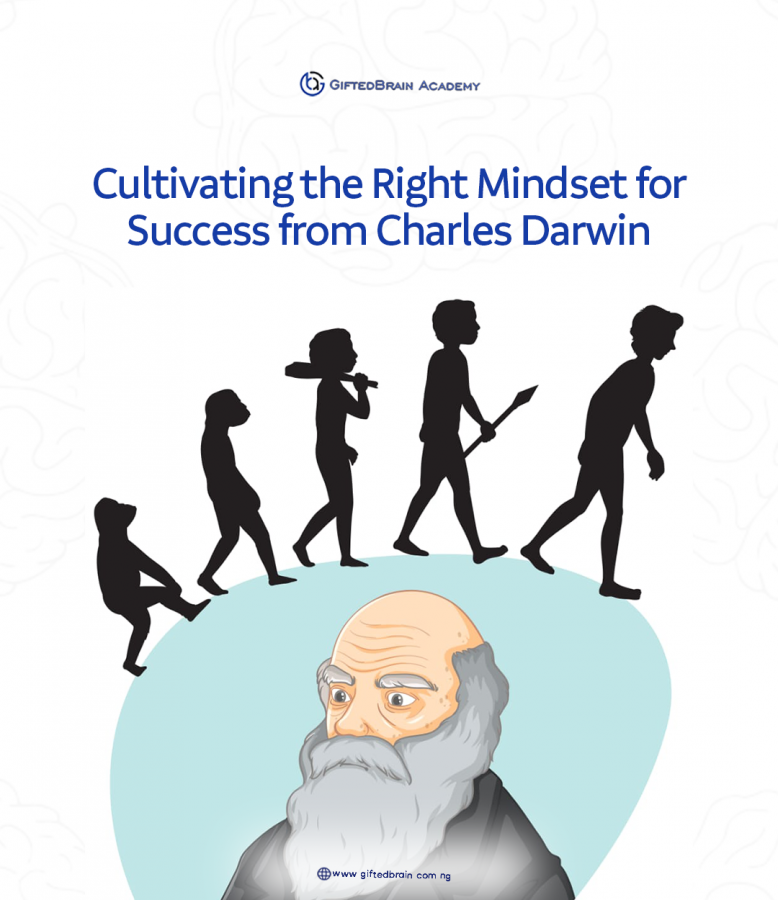What’s the reason why people are able to achieve their goals while others aren’t?
If I heard you correctly, you would probably have said, “the right mindset”.
The right mindset is pivotal because it shapes how individuals approach difficulties, setbacks and failed opportunities.
A person with the right mindset fosters resilience, determination, and a willingness to learn from setbacks or failures.
They tend to stay motivated, overcome challenges and maintain focus on their goals, increasing their chances of success.
In today’s article we will be considering the ways to cultivate the right mindset for lasting success from the lens of Charles Darwin by buttressing his mindset and his contribution to science.
But before this, let’s explain the major types of mindsets according to Carol Dweck.
Types of Mindset
There are two types of mindsets.
The first is the fixed mindset. Individuals with this mindset believe their basic qualities, abilities, intelligence and talents and do not substantially develop their traits.
The second is the growth mindset. Those with a growth mindset believe that their basic intelligence, talents and abilities can be developed over time through experience, dedication, hard work, and learning. Explore additional insights into this by delving into the hierarchy of a growth mindset.
Talents and skills are significant possessions because they make way for those who have them. However, having these skills, intelligence and talents does not guarantee a person’s success. What guarantees success in life is the work put in together with the right mindset.
Cultivation implies developing, nurturing or training a quality or a skill.
Charles Darwin and his Contribution to Science

Charles Darwin was born on the 12th of February in 1809, at the mount house Shrewsbury, United kingdom.
He was an English naturalist, geologist and biologist. He is often called the father of modern science.
Charles Darwin is most famous for his groundbreaking work on the theory of evolution by natural selection.
This, of course, helped to revolutionise biology: and changed the world’s understanding of the origin and diversity of life on earth and their interconnectedness.

Charles Darwin’s groundbreaking theory of evolution by natural selection challenged prevailing ideas about the origins of species and had profound implications for various scientific disciplines. Darwin’s work laid the foundation for modern evolutionary biology, and his emphasis on empirical observation and evidence-based reasoning set a standard for scientific inquiry. The impact of his ideas transcended biology, influencing fields such as anthropology, psychology, and genetics, making him a central figure in the development of modern scientific thought.
Apart from this, darwin also made other contributions in to the field of biology of which are:
- Geological Studies: Darwin’s observations during his voyage on HMS Beagle contributed to geological knowledge, including his studies on coral reefs and his insights into the earth’s history.
- Botanical Research: Darwin conducted extensive botanical research, studying plant adaptations and interactions. His work on orchids, for instance, explored the intricate relationships between flowers and pollinators.
- Taxonomy: Darwin made valuable contributions to taxonomy, classifying and describing numerous species. His taxonomic work included studies on barnacles and fossilised species.
- Expression of Emotions in Man and Animals: In his book “The Expression of the Emotions in Man and Animals,” Darwin explored how emotions are expressed across species, laying the groundwork for the study of ethology and psychology.
- Coral Atoll Formation: Darwin’s observations of coral atolls led to his theory on their formation, involving the subsidence of volcanic islands over time.
- Pangenesis: Although not widely accepted, Darwin proposed a theory of heredity called pangenesis, suggesting that particles called gemmules carry information from various parts of the body to reproductive cells.
Darwin has been described as one of the most influential figures in human history. He was able to achieve all these not only because of the skill, intelligence and abilities but because he thrived to develop, nurture and cultivate his ideas, carrying out endless research, experiments, asking the right questions and endlessly seeking knowledge.
He knew he had the ideas and intelligence but he also knew that it wouldn’t be enough to take him as far as he wanted. Talent, intelligence and abilities will falter when not developed or cultivated. Discover tips to develop a growth mindset by clicking on the link above.
Charles Darwin’s Mindset for Success

Darwin’s success can be attributed to the following characteristics and key traits:
1. Curiosity
Like many parents, Darwin’s father who was a doctor wanted him to have a medical degree but Darwin was more interested in Natural History than Medicine.His curiosity became a guiding force that moved him to explore, question, and ultimately formulate transformative ideas that revolutionised our understanding of life on Earth.
Passion plays a vital role in the decisions we make in life, what we become and how far we go.
Passion breeds curiosity. One can only be curious about what he is passionate about.
It’s as simple as that, but the funny thing is, most of us still don’t get it.
Take for instance, students who tend to choose courses that they aren’t passionate about because of parents, friends,etc. The chances of success at this rate will be extremely slim. What is Curiosity? It is a strong desire to know or learn or know something. It implies that curiosity does not just work on its own, it has to be fueled with passion because this is what really brings about curiosity.
Heightened curiosity with a combination of passion can lead to dedicated inquiry, innovative thinking, and willingness to delve into the intricacies of a particular field no matter how difficult it may be.
Don’t let anyone make you take a step you aren’t passionate about because if you do, you are going to suffer the results and repercussions alone.
2. Observation
Darwin was an astute observer. All of Darwin’s groundbreaking theories originated from a combination of curiosity then, observation. Learn to think out of the box, be innovative and receptive to learning.
Try to observe things that others don’t.
In order to be receptive to learning, you have to know your pattern of learning. There are different types of learners and it is important for you to understand your learning style.
3. Open mindedness
Darwin was willing to challenge prevailing scientific and societal norms. He was open to new ideas and evidence, even if they contradicted his established beliefs.
When a person is open minded, he gives room for more growth which could help him succeed in his endeavours. As humans, we have our various experiences and beliefs systems that have helped in shaping our perspectives about life situations and how we react or handle them. This can however become a disadvantage rather than an advantage. As the world is evolving we must also learn to evolve with it.
Do not be closed minded.
Learn to listen to other people’s alternative opinions. Afterwards, contemplate on them objectively. Then compare your ideas with the opinion you have been served and see which works best.
No man is an island; we all need each other to succeed, and it is better to work smart than work hard.
When a person is closed minded he gives little room for learning and growth, this in turn becomes a barrier to success.
4. Perseverance
The development of his theory of evolution took decades of careful research, observation, and contemplation. Darwin persisted through challenges and setbacks, demonstrating resilience in the face of criticism.
Perseverance is the effort to do or achieve something despite difficulties, failure or opposition.
Darwin must have probably had friends who criticised him about his theories, especially the theory of evolution which he made in 1836 and published in 1859. And yes, at some point, he would have also wanted to give up on it. But he kept believing, researching, seeking knowledge from other scientists and experimenting until he made his first publication in 1859- which took over twenty years. Just Imagine the joy he must have had.
If success must be achieved, perseverance must be attained; It cannot be gotten in a day and demands a continuous, rigorous, and vigorous process but the outcome is worthwhile.
” Success is not the absence of failure, it is the persistence through failure.” ~ Aisha Tyler
5. Adaptability
Darwin’s ability to adapt his thinking based on new information and insights was crucial. He adjusted his ideas in response to evolving evidence, and was willing to refine his theories.
Another pivotal tip to attain success is to adapt to new ideas. Change in life, they say, is constant.
Embrace change and make something useful out of it.
Change is not a bad thing.
Most people are often scared of change; scared of the unknown, which shouldn’t be the case. There are actionable steps to help you overcome fear. Learning to shift your mindset to changes around you broadens your perspectives and insight, enhances skill which gives you more experience and deepens your understanding.
Conclusion

Success is something everyone wishes to have and it’s so easy to fantasise and envisage it but it demands the right mindset. For a person to succeed, you first must be clear about your identity; your talents, gifts and area of specialisation. Then, work on developing them-don’t sit on them. This is the only way success can be attained.
Successful people usually have certain habits that shape and differentiate them from others with outstanding success. Curious to know what these habits are? Click on the link for more information.
Jim Kwik says that power is knowledge and learning is your superpower. Enjoy learning and make it a habit. It is essential for personal growth, acquiring skills and making informed decisions.
Learn to manage your time by using it profitably. In this article, you will find some tips to help you effectively manage your time.
“You don’t have to be great to start but you can start to be great”. ~ Zig Ziglar


